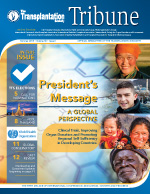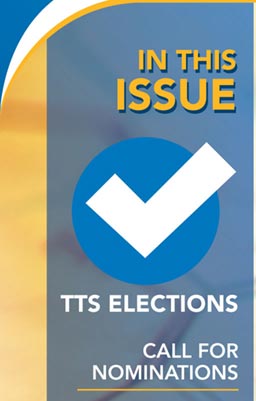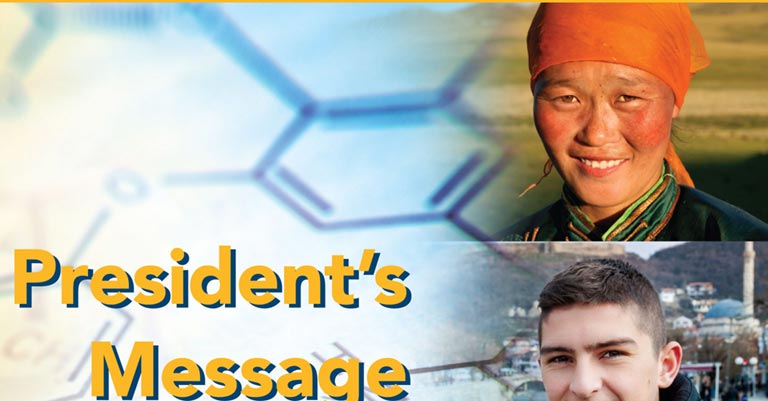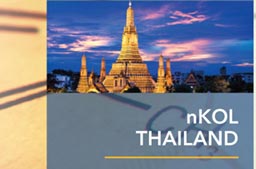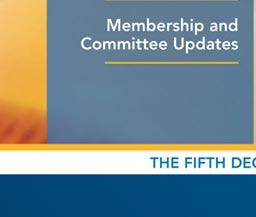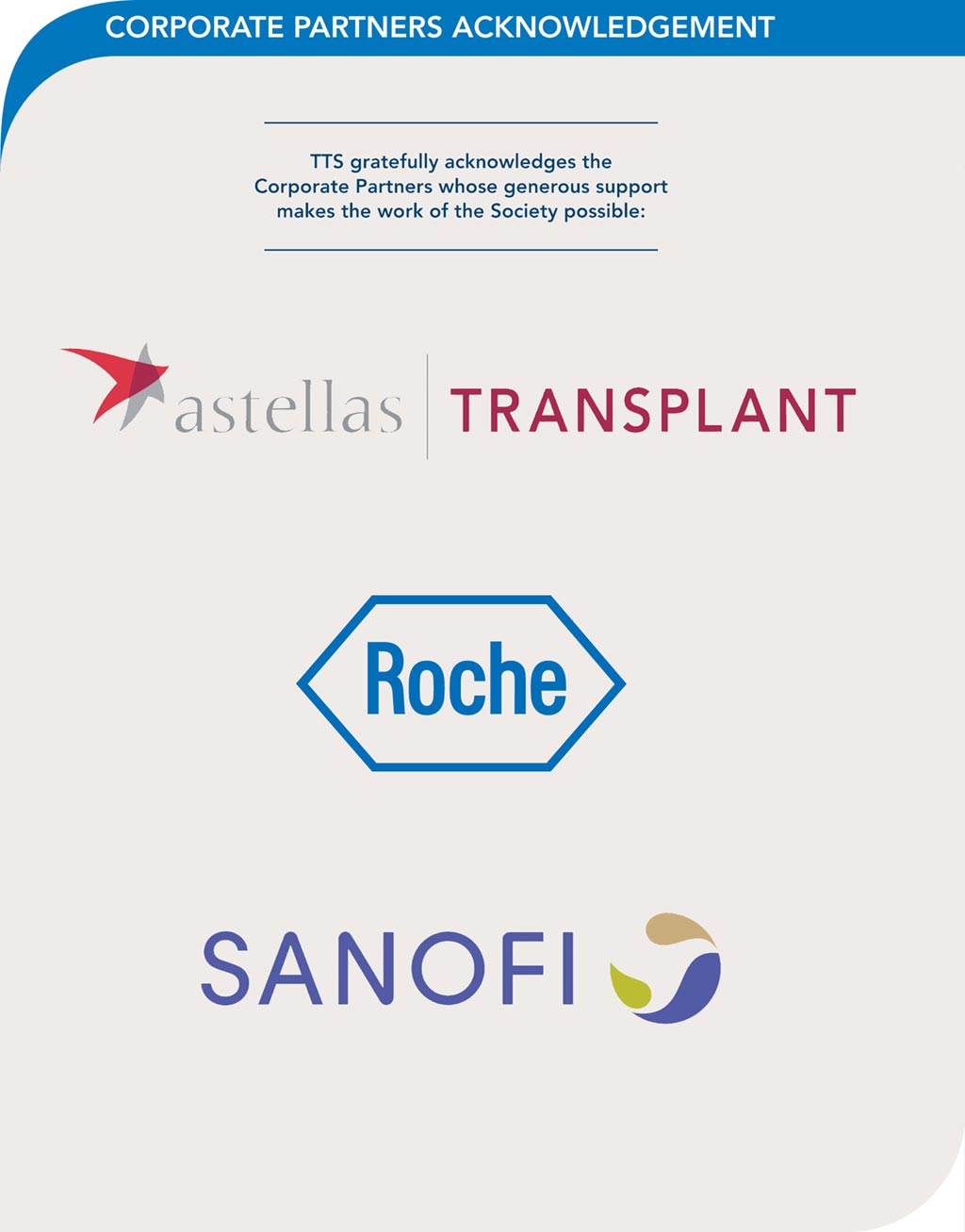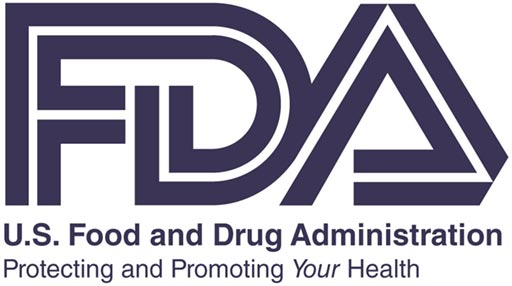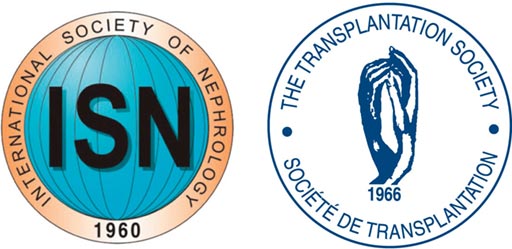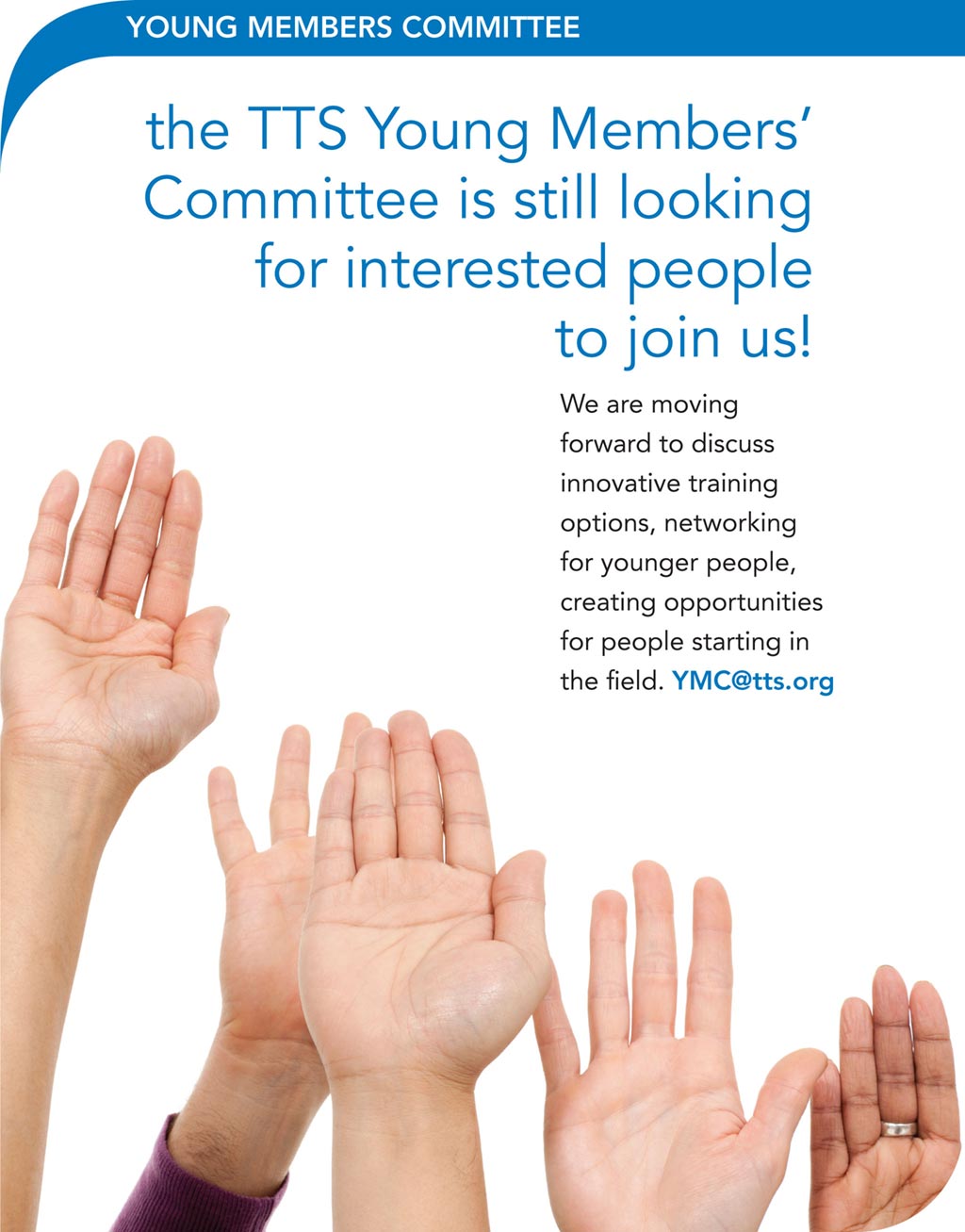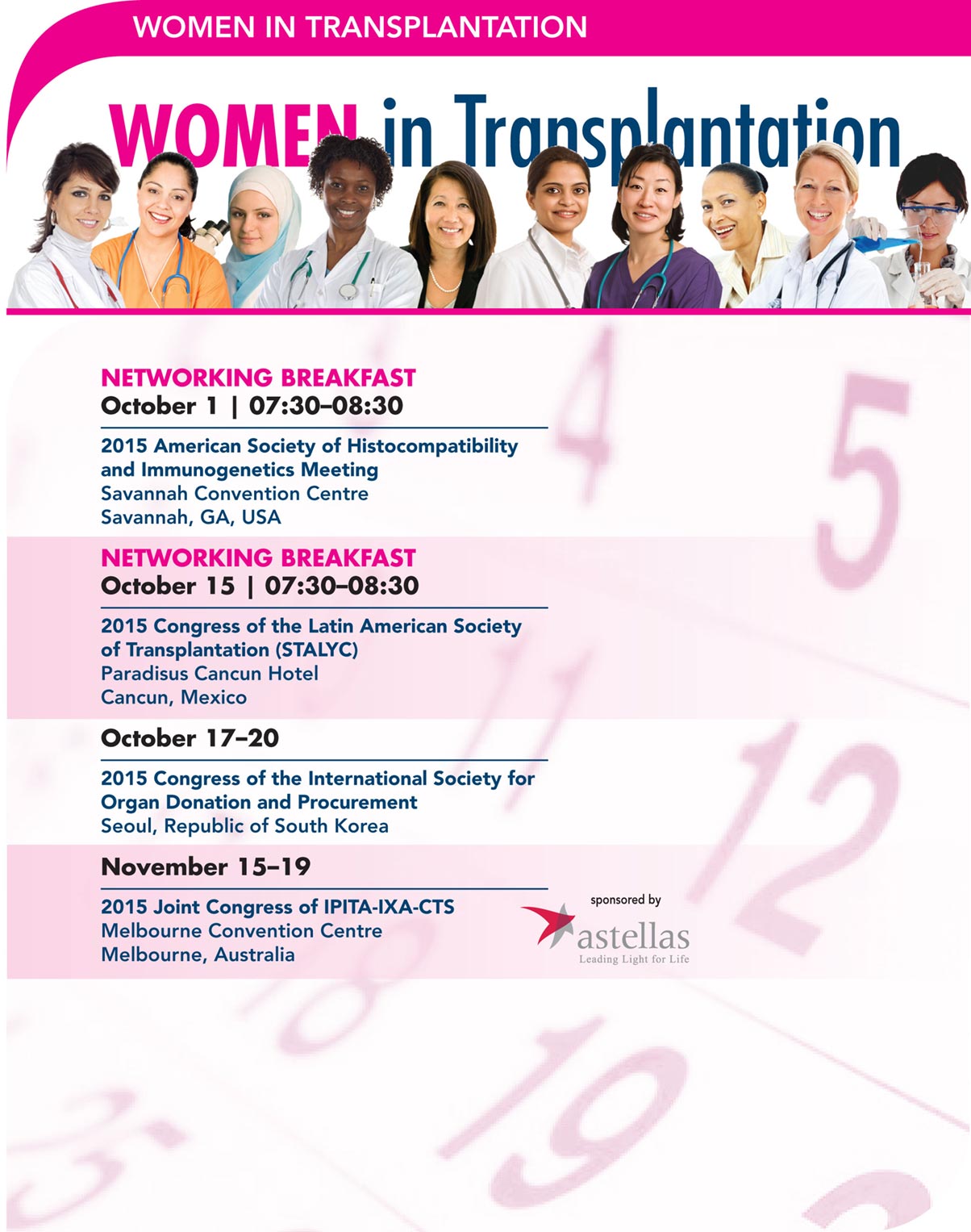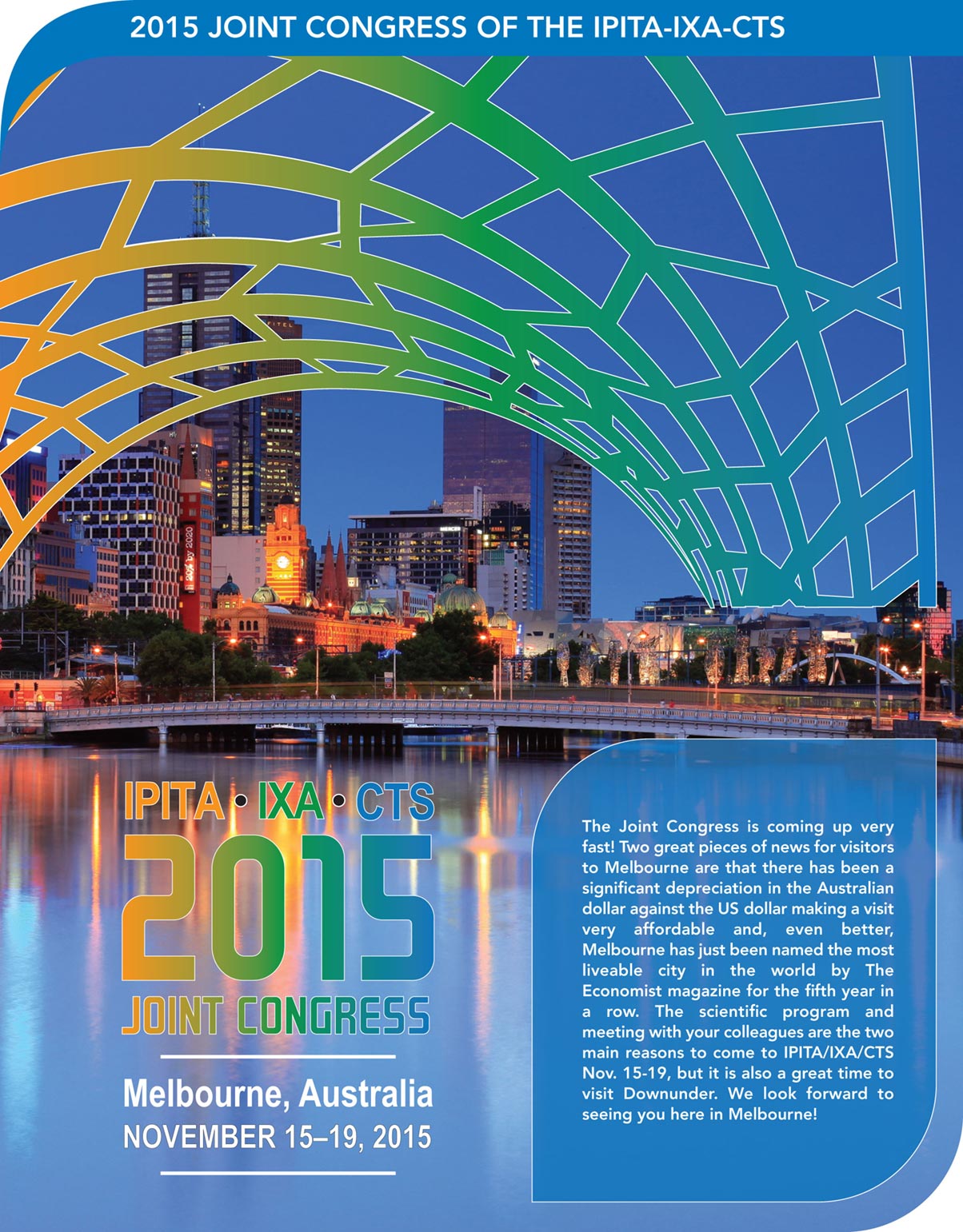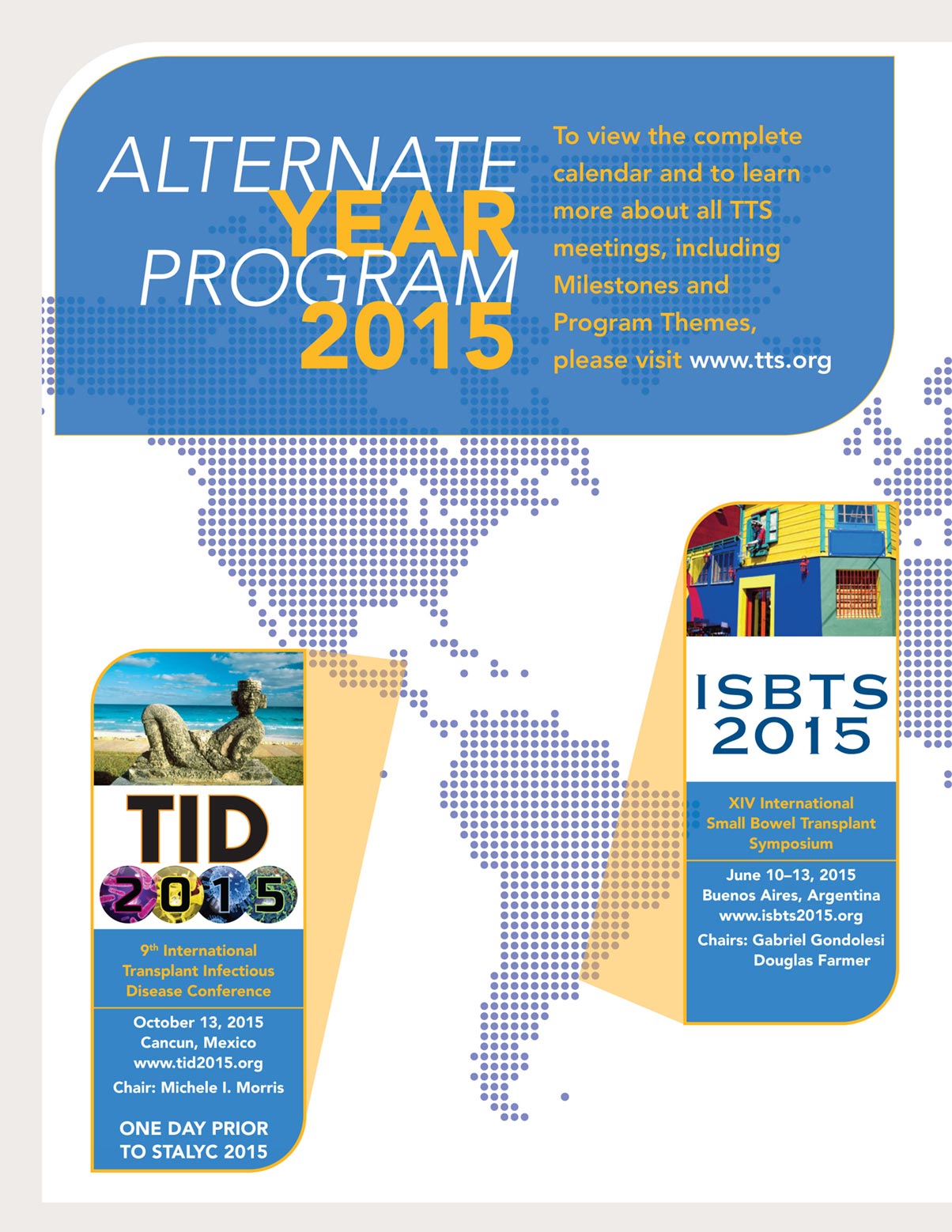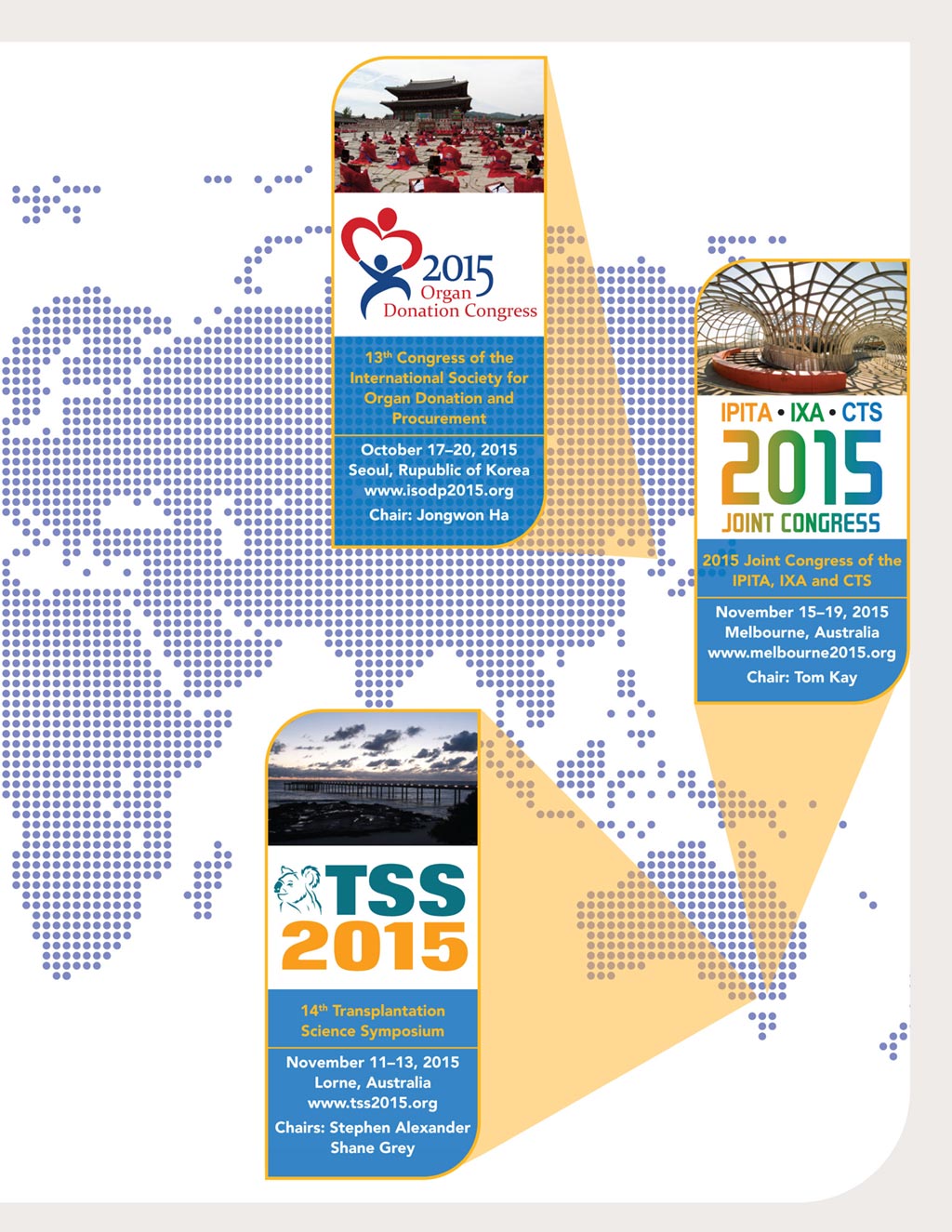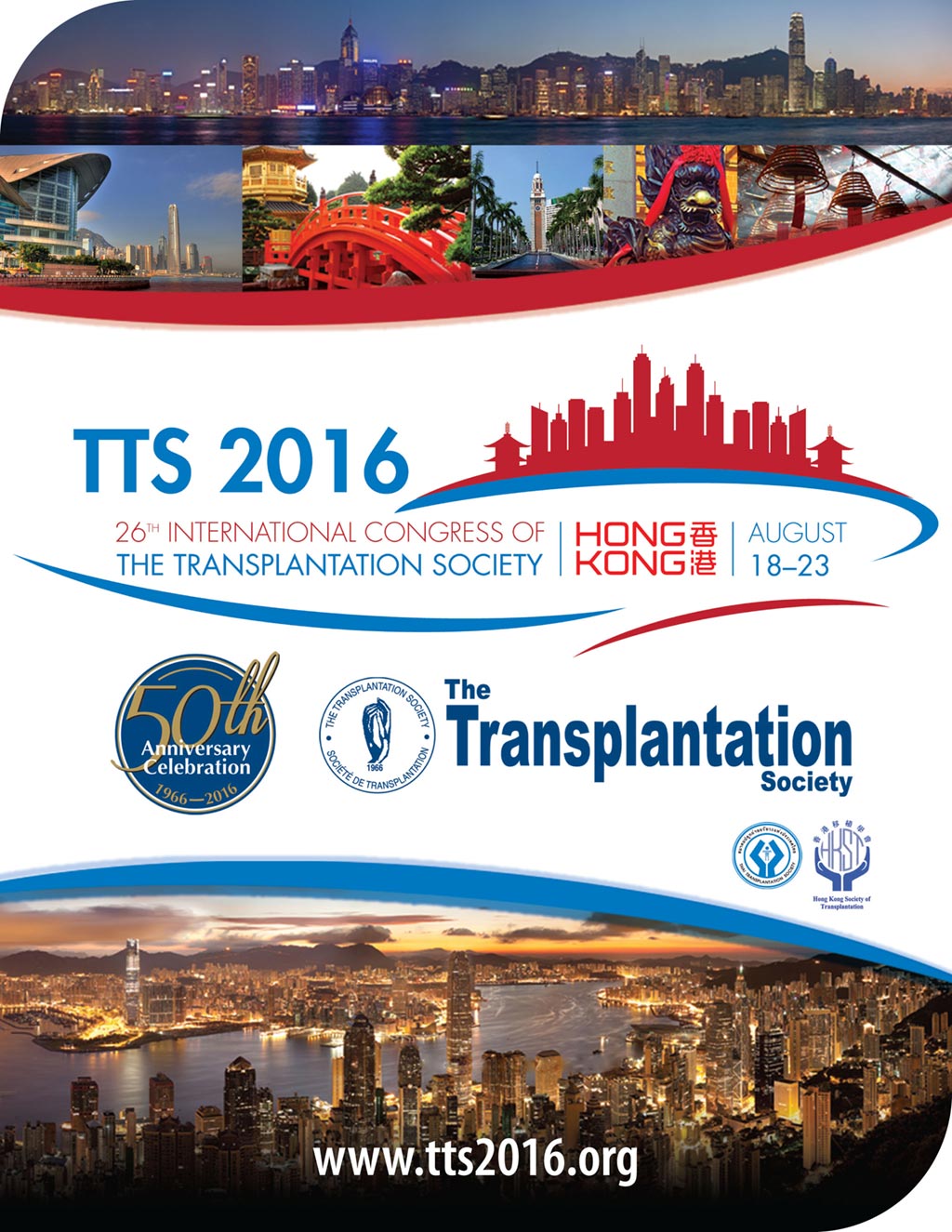Newsletter 2015 Volume 12 - Issue 2

When one looks at organ transplantation from a global perspective, it is clear that much remains to be done. Of the more than 2 million people world wide on dialysis, less than 4% receive a renal transplant each year. As poorer countries improve their living standards, they are more likely to have rapidly expanding dialysis programs rather than a rapidly expanding transplant program. This is despite the fact that transplantation is cheaper and more effective therapy. It is tempting to look at this problem in simplistic terms, where in reality the issues are complex. Whilst it is obvious that improving organ donation and promoting regional self-sufficiency would have a major impact on transplantation rates, there are other major obstacles to transplantation, especially in developing countries.
The cost of ongoing care and immunosuppression are significant barriers to transplantation. Although most of our first line immunosuppressive agents are off patent and are priced competitively through the introduction of generics, more could be done to increase access to these life saving drugs in less wealthy countries. This issue has been identified by our Public Policy committee as a major block to transplantation and recently they have agreed to develop a strategy promoting affordable immunosuppression. This will require negotiation with governments and the pharmaceutical industry in order to expand access to these drugs. Nancy Ascher will lead a group of Council and other committed members from the Society to develop a strategy that we are confident will lead to change in this area.
|
there is a distinct lack of enthusiasm for developing new agents for transplantation, despite many new immunomodulating agents being developed for other immune related diseases. It is up to the transplant community to change that. |
Another important component of improving transplantation rates is to improve the long-term outcomes after transplantation. Improving 5- and 10-year graft outcomes and reducing side effects of immunosuppression remains an unmet clinical need in our field. Improvements in this area will require better immunosuppressive agents and improvements in clinical trial design. Unfortunately there is a distinct lack of enthusiasm for developing new agents for transplantation, despite many new immunomodulating agents being developed for other immune related diseases.
It is up to the transplant community to change that. That is why TTS will be hosting a consensus conference on clinical trial design this month. This will be held in conjunction with an FDA Workshop on Surrogate Endpoints (SEPs) in Clinical Renal Transplant Trials. By bringing together transplant professionals with expertise in clinical trials, TTS aims to reinvigorate this area of transplantation and create an environment where meaningful trials that focus on areas of concern for the transplant community can be undertaken and in doing so provide the necessary evidence to change clinical practice and improve the life of our patients.
Whilst these strategies aim to improve transplant outcomes in all regions, many countries from emerging economies face many challenges setting up national transplant programs so that their citizens can achieve the benefits that transplantation offers and reduce the need for their patients to travel for transplantation: a situation that fosters transplant tourism, commercialization and trafficking. Assisting our colleagues in dealing with these challenges requires a multipronged approach. Not only do their health authorities need advice about regulatory frameworks for national organ donation and transplant programs, they need assistance in developing clinical programs in surgery, medical care, tissue typing, pathology and management of infectious diseases.
It is a major focus of TTS to assist countries, such as those in Central America and South East Asia in delivering transplant programs to their citizens. In collaboration with the International Society of Nephrology, we have developed the Sister Transplant Center Program, where modest grants are given to promote collaboration between a transplant program in a developing region with one in a developed region. The aim is to foster collaboration between the two centers and expand capacity and expertise in the developing center. Currently nine such collaborations have been funded.
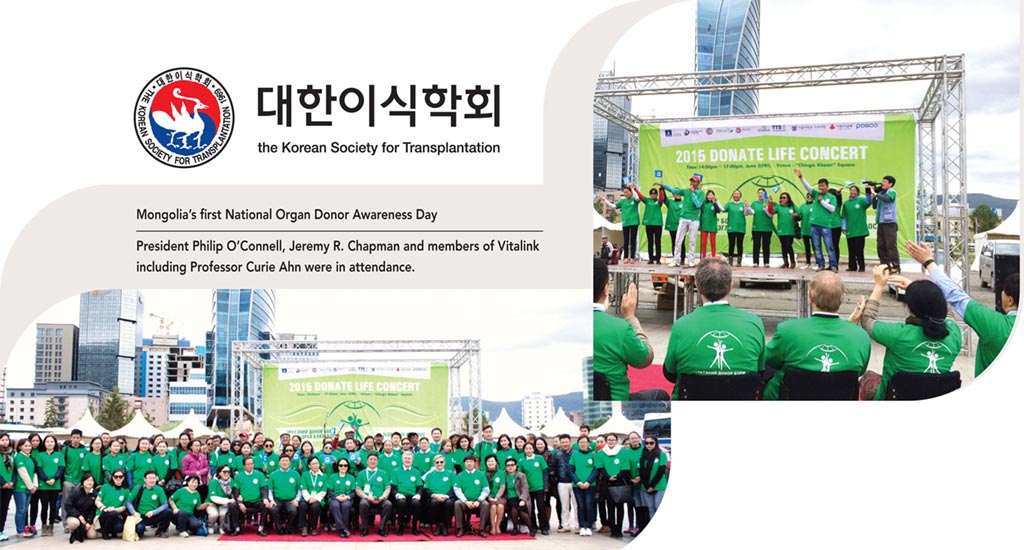
Recently, at the invitation of the Mongolian Society of Transplantation and Vitalink, Jeremy Chapman and I visited Ulan Bataar where we took part in a two-day educational program and spoke at a round table with the Mongolian health authorities on how to develop a national organ donor program within the country. We were also given the privilege to speak at a community event on their inaugural National Organ Donor Day. Vitalink is a non-profit organization set up by the Korean Society of Transplantation with the aim of promoting ethical organ donation in their region.
In collaboration with the Rafael Clinic (a charitable organization established by Korean doctors), they have been working for many years in Mongolia with the aim of assisting their colleagues in establishing a viable transplant program for the Mongolian people. It was inspiring to take part in this initiative and see the enthusiasm and collegiality that has developed between the Mongolian and Korean transplant teams. TTS aims to assist both sides in this challenge and provide educational material and expertise where needed.
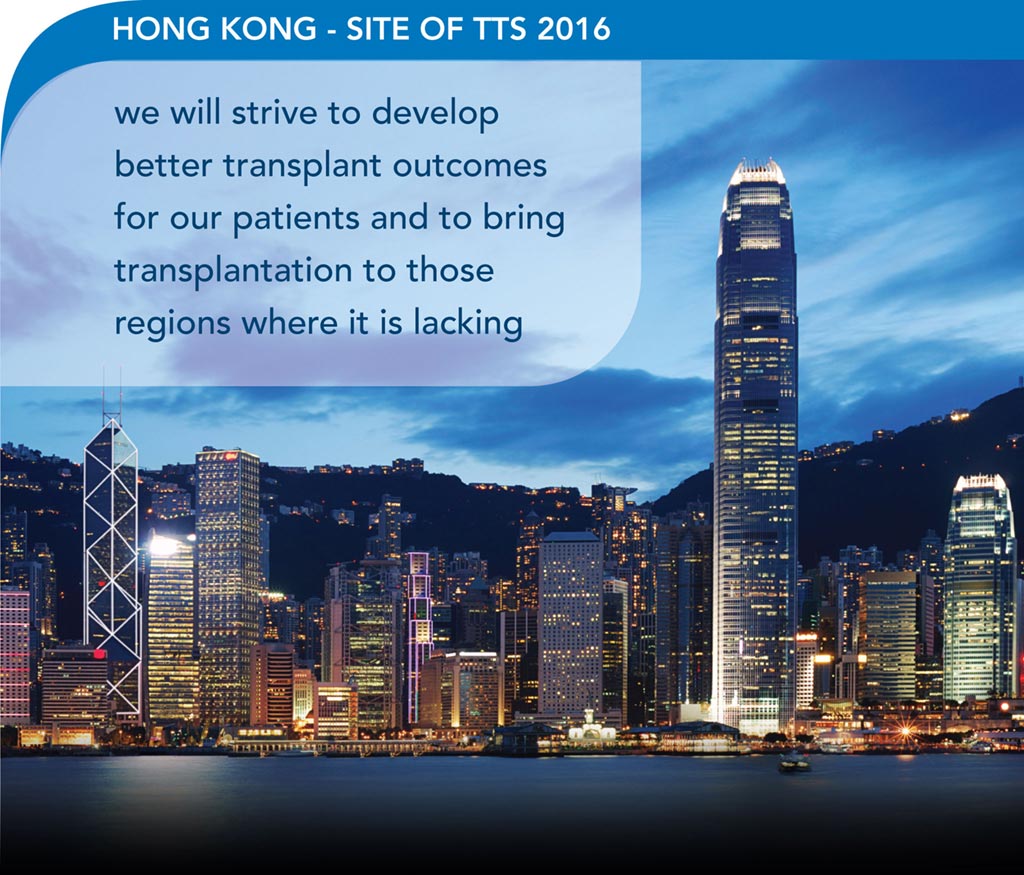
What I have witnessed over the past 12 months as President is the uniqueness of our Society. We have many committed individuals freely giving their time to develop high quality education, robust and innovative public policies and always promoting the best in science. All these skills have been necessary to develop the initiatives we are currently undertaking. As always we will strive to develop better transplant outcomes for our patients and to bring transplantation to those regions where it is lacking.
As a final note, I wish to remind you that it is less than 12 months until the 26th Congress of our Society. I urge you to read the latest updates from the program committee which are in this edition of the tribune and on our website. The program committee is working hard to develop a highly innovative program with many exciting, high profile speakers to be invited. As always I look forward to meeting as many of you as possible at either regional transplant meeting or at several of our section meetings. If you have any suggestions for Council or any concerns, please do not hesitate to contact me.

In 2016, three Officer positions will be vacated and 6 of the 12 councilors-at-large representing the regions will be changing. The elections will take place early in 2016 and those elected will assume their new roles following the 2016 TTS Congress in Hong Kong.
Nominations are being sought for these positions. Members can access the online nominating form at www.tts.org/nominations. Since each nominee must have his or her form signed by three supporting members (including him/herself), the online process allows for efficient and rapid circulation.
The nomination deadline is January 15, 2016
Please note:
- As successive presidents may not be from the same region, members from the North American region who would have otherwise been eligible to become President-Elect are not eligible in these elections.
- Only members who have served a full term on Council are eligible for the Officer positions (President-Elect, Secretary and Treasurer).
- Only full members who have paid their dues may nominate and/or vote.
For more information on elections, visit the TTS website and consult the by-laws in the “About” section.
Officer Positions:
- President-Elect
- Secretary
- Treasurer
TTS Regions:
- Asia
- Europe
- Latin America
- Middle East / Africa
- North America
- Oceania
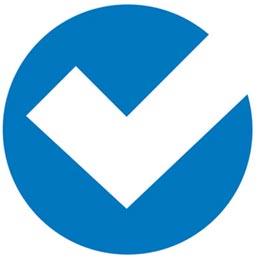



We are one year out!
August 2016 is now less than twelve months away, and our various planning committees involved in the International Congress in Hong Kong have been increasing their pace.
Our Program committee worked through the summer to line-up outstanding international speakers for the Plenary and the State-of-the-Art sessions, and the program is taking shape rapidly. We have a broad reach of subjects from clinical science through to the latest breakthrough areas in basic immunology, represented by plenary sessions on the new Hepatitis C treatments, antibody mediated rejection and the role of the microbiome in shaping the immune system. We will consider transplantation reform across the world, including the changes in China. Abstract submissions opened on September 15 and can be submitted via our website at www.tts2016.org.
The TTS Headquarters team was recently in Hong Kong and had productive meetings with our Host Country Liaison Committee. They have assembled a very professional team of congress suppliers and partners that are local to Hong Kong and forged strong relationships at our chosen venue, the beautiful Hong Kong Convention and Exhibition Centre. Nothing will be left to chance to ensure that you, our participants, are offered a truly amazing congress experience at what is gearing up to be the largest International Congress of The Transplantation Society ever with over 5,000 participants.
Supported by the TTS Headquarters team, our local hosts from the Hong Kong Society of Transplantation and the Thai Transplantation Society deployed a large-scale promotion campaign all over Asia a few weeks ahead of our first important milestone, the opening of the Call for Abstracts. Close to 3,000 abstracts are expected to be submitted by authors from over 75 countries. Recognizing the changing learning needs of our current and future members, TTS will be introducing novel methods of presentation for these abstracts alongside more traditional presentation formats. We aim to offer an unprecedented diversity and richness in the congress educational environment!
Stay tuned and informed about our progress through our monthly congress newsletter and articles in upcoming issues of the Tribune. Make sure to submit your abstract starting September 15, 2015, and reserve your spot at the congress by registering starting October 12, 2015.
In August 2016, meet with us in Hong Kong — Asia’s World City!
Philip O’Connell
TTS 2016 Congress Chair
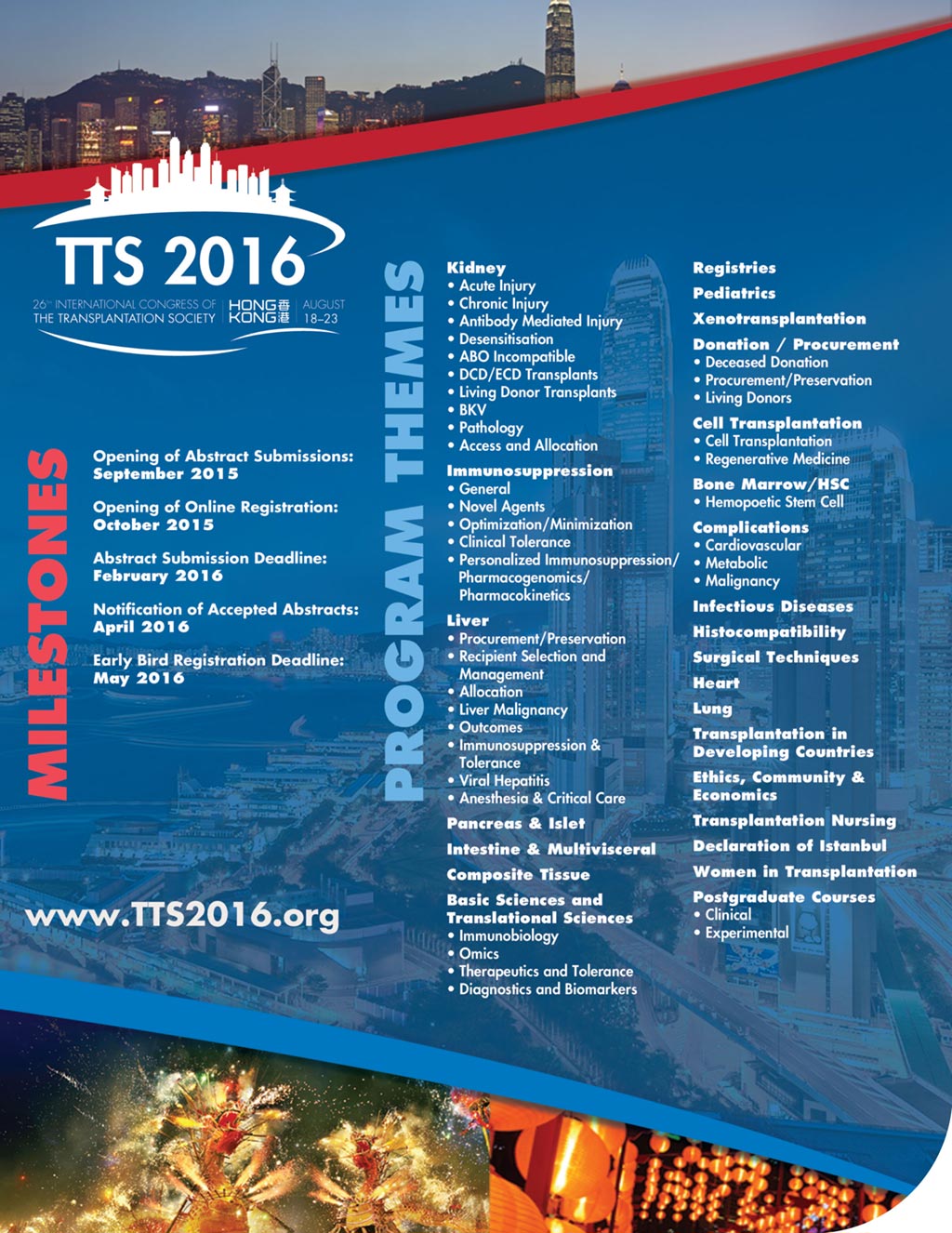


The TTS Executive Committee and Dr. Vasant Sumethkul will be co-organizing a “TTS-New Key Opinion Leaders (nKOL)” Meeting in Bangkok, Thailand from March 2-3, 2016.
The key objective of this newest meeting in the nKOL series is to identify potential key opinion leaders of tomorrow from Asian countries. Established Key Opinion Leaders will be asked to nominate a nKOL from their program to attend the meeting and contribute to the joint lecture on their research. Presentations will include a series of topics covering basic, translational and clinical science as well as clinical data, which will generate a broad and in-depth discussion conducted by the KOLs, nKOLs and TTS invited guests. This two-day meeting will consist of approximately twenty presentations. Each presentation will be 20 minutes in duration and will be followed by 10 minutes of discussion by meeting participants. The presentations may be given in the format of “Asian Perspective” lecture or “Ongoing Original” work that will benefit from subsequent group discussion. Topics ranging from Transplantation Medicine and Surgery, Clinical Transplantation, Transplantation Science, Immunology, HLA typing, Solid Organ Transplantation, Cell Transplantation and Experimental Transplantation will be open to presentations and discussions.
This meeting is being sponsored by The Transplantation Society and will be represented by Dr. Philip O’Connell (TTS President and Meeting Co-Chair) and Dr. Nancy Ascher (TTS President-Elect and Meeting Co-Chair). The Meeting Host and Co-Chair is Dr. Vasant Sumethkul (TTS 2016 Congress Vice-Chair) and the hosting organization is the Thai Transplantation Society chaired by Dr. Kriengsak Vareesangthip. The Japanese Society of Transplantation, the Korean Society of Transplantation and the Hong Kong Society of Transplantation will further support this effort.
This meeting will serve as a forum for exchange and collaboration between TTS and transplantation professionals from the Asian community. Asian transplant experts will have ample opportunity to commune and are confident that this will lead to greater TTS collaboration within the region. This event is also considered a milestone on the road to welcoming to Asia the TTS 2016 Congress, being held in Hong Kong from August 18-23.
For KOLs and nKOLs interested to propose a topic to present in this meeting, please contact Dr. Vasant Sumethkul via the e-mail vasant.sum@mahidol.ac.th. The deadline for submission of the proposal is no later than November 10, 2015.
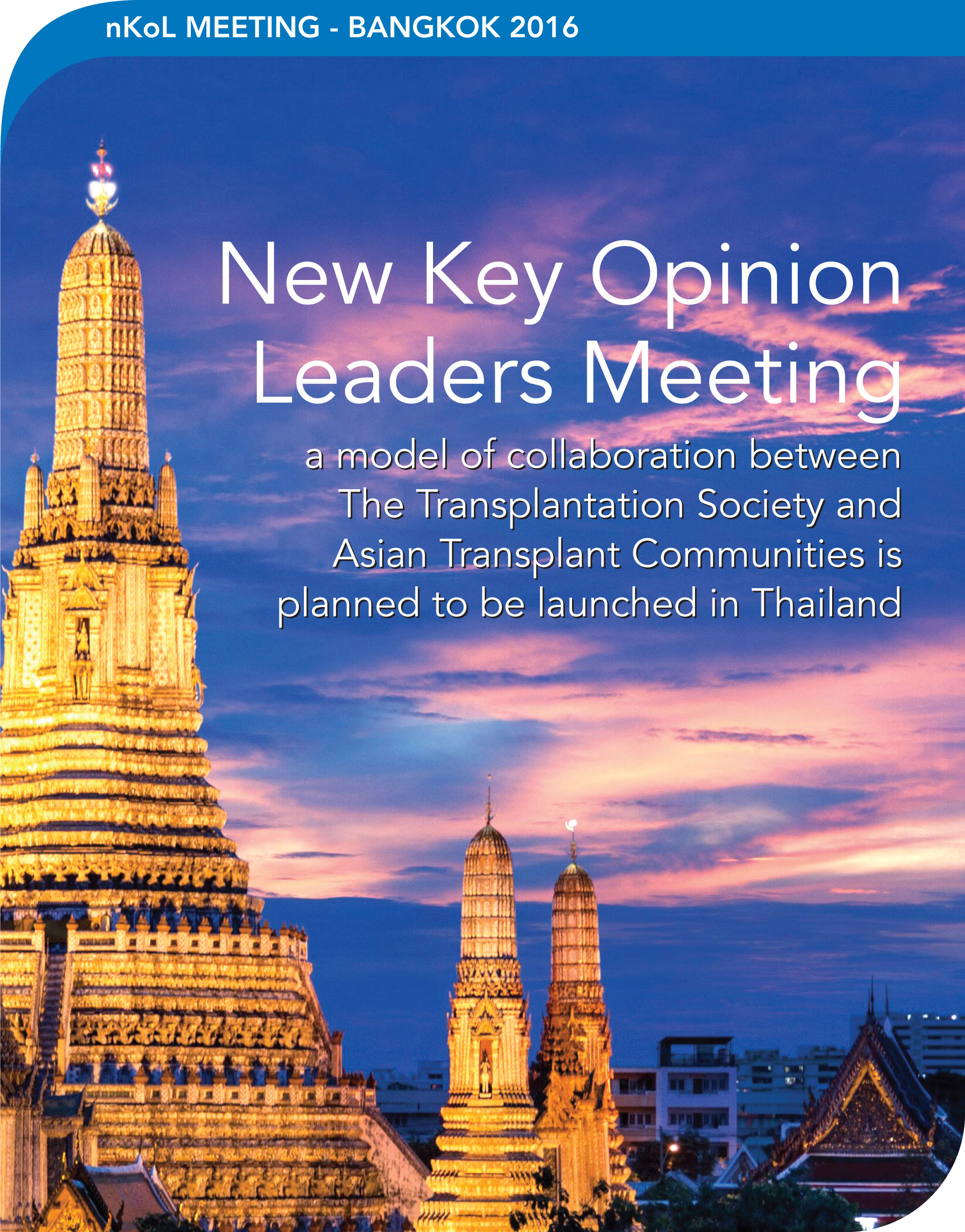

The Declaration of Istanbul Custodian Group (DICG) has led the initiative in the debate within the Unites States regarding financial incentives for organ donors by an open letter to the US Secretary of Health and by making the DICG position clear in the recent publication in the American Journal of Transplantation: The Living and Deceased Organ Donation Should Be Financially Neutral Acts.
The open letter to the US Secretary of Health was published in the first issue of Transplantation Direct calling upon the Department of Health and Human Services to convene a task force to address the decline in the number of living organ donors and the plateau of deceased organ donors in the United States by removing financial disincentives to living (and deceased) donation.
These DICG activities are consistent with a Strategic Plan of DICG that was developed at meetings of DICG Council in London and Cape Town, South Africa in 2015. The Strategic Plan identifies countries that DICG will target for intervention in combating organ trafficking. The factors considered in selecting countries for involvement include:
- an existing program that transplants organs into foreign patients and/or relies on vended organs for foreign or domestic patients;
- growing need for, and existence of, dialysis based upon increasing rates of end-stage organ failure and growing economic development;
- an existing relationship between the DICG and one or more transplant programs in the country; and
- the feasibility of engaging with the country, based upon an identified champion within the country with access to government.
DICG is continuing to respond with notice to health authorities when it receives reports of unethical or illegal transplant practices.
DICG has been instrumental in the progress of cessation of organs removed from executed prisoners in China. DICG made a report to the European Parliament regarding the recent developments that has China publicly proclaiming its intention to stop this unethical practice. Together with representatives from TTS, DICG participated in a national meeting in Guangzhou in August to address the development of an alternative infrastructure for a national and provincial organ donation agency.
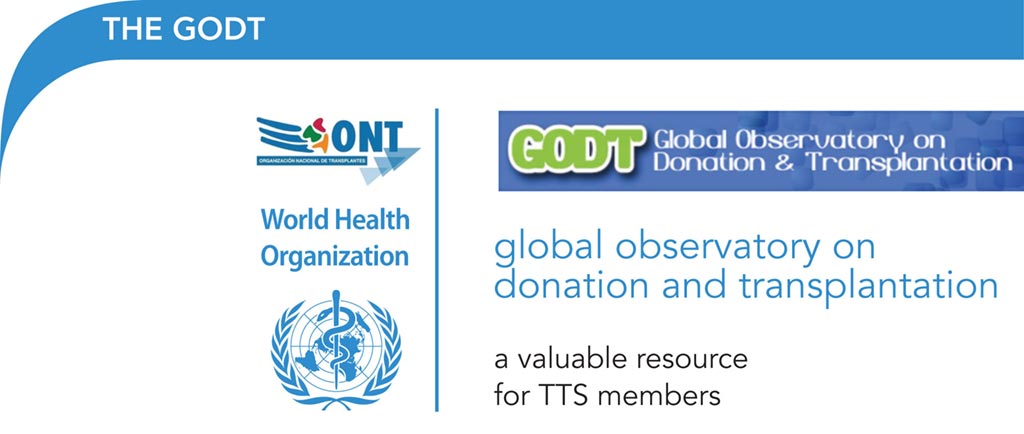
Developed by the Spanish National Transplant Organization (Organización Nacional de Trasplantes-ONT) in collaboration with the World Health Organization (WHO), the Global Observatory on Donation and Transplantation (GODT) represents the most comprehensive source to date of worldwide data concerning activities in organ donation and transplantation, as well as information on legal frameworks and organizational aspects of this practice.
The objectives of the GODT are to collect, analyze and disseminate this information among authorities and health-care professionals in all WHO Member States. Information is collected from a network of official focal points designated by Ministries of Health of participating countries. They are responsible for providing details on the legislative and organizational aspects of donation and transplantation and reporting the annual activity practices through a specifically designed questionnaire.
One hundred and twelve out of the 193 WHO Member States covering more than 90% of the global population contribute to this project. Estimates of 2013 activities offer the figure of 118,127 solid organ transplants carried out during that year, with disparities in activities across regions and countries. The GODT makes available detailed data globally, per region and per country of high value for users, including TTS members. Efforts are under way to facilitate the use with interactive graphs and data files to be used for documentation and research. TTS members are invited to visit the site at www.transplant-observatory.org and get familiar with this important source of information.

Our two associations have enjoyed a strong ongoing relationship and TTS was grateful for the generosity of the CAST organizers in enabling our presence at this important Asian meeting.
TTS President Dr. Philip O’Connell was invited to give a Plenary Lecture on the Current Status of Transplantation, alongside the Congress President Dr. A. Vathsala who talked about Challenges and Successes in Asia. AST and TTS also organized a Joint Ethics Session tackling the challenges surrounding Living Donor Psychological Evaluation. Co-chaired by the TTS Ethics Committee Co-Chair Dr. Dominique Martin, the special session featured speakers from New Zealand, Qatar, Singapore, Sri Lanka, and concluded on a call to action from TTS Past President Francis L. Delmonico for the emergence of cross-border professional networks to counteract transplant tourism.
Finally, the TTS Women in Transplantation group organized a luncheon symposium on the last day of the event, featuring strong Asian women sharing their journey as transplant professionals: Dr Dibya Singh talked about her experience starting the first renal transplant programme in Nepal, and a panel discussion ensued where she was joined by Dr. Benilla Padilla of the Philippines, Dr. Yuki Nakagawa of Japan and Dr. A. Vathsala of Singapore.
During the 4-day event, our TTS Headquarters staff manned an exhibition booth giving information about TTS membership and initiatives as well as promoting our TTS 2016 Congress to be held in Hong Kong next August. They enjoyed a sustained interaction with the participants and came back from Singapore with many new friends!
TTS took advantage of this opportunity to personally invite our Asian colleagues to attend our 2016 Congress in Hong Kong, and we also look forward to a future collaboration at the CAST 2017 edition to be held in the Philippines.
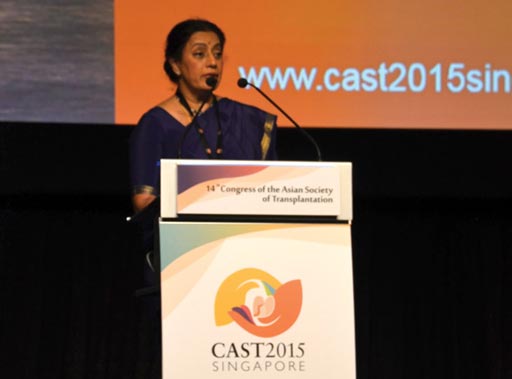
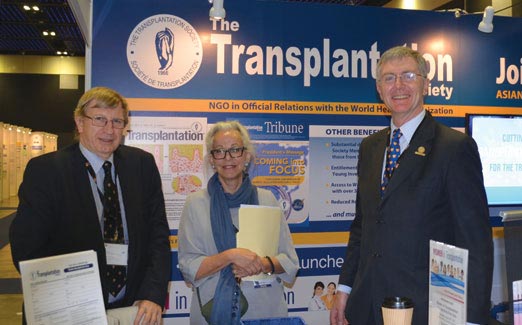
Jeremy R. Chapman, TTS President-Elect Nancy A. Ascher, and TTS President Philip J. O’Connell.

The Hong Kong Society of Transplantation was incorporated in March 1995. The major objectives of the Society include:
-
To promote for the public benefit the interests in and a better understanding of the advancement of science and knowledge in the transplantation and harvesting of organs and tissues.
-
To promote organ donation.
-
To promote research, education, training, and appreciation in the science and technology of transplantation, and to make available to the community up-to- date information on new developments in transplantation and organ/tissue harvesting for public benefit.
-
To promote academic and social exchange among local and overseas transplant community, and to organize activities/conferences in this respect.
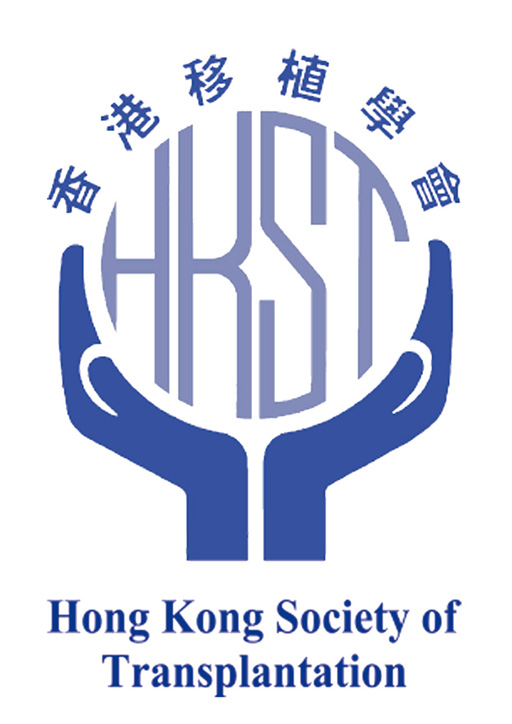
- Asian Society of Transplantation (AST)
- Asociacion Guatemalteca de Nefrologia
- Associacao Brasileira de Transplante de Orgaos (ABTO)
- Asociacion Colombiana de Trasplantes de Organos (ACTO)
- Austrotransplant
- Belgian Transplantation Society (BTS)
- British Transplantation Society (BTS)
- Canadian Society of Transplantation/
- Société canadienne de transplantation (CST)
- Deutschen Transplantationsgesellschaft
- International Transplant Nurses Society (ITNS)
- Hong Kong Society of Transplantation (HKST)
- Nederlandse Transplantatie Vereniging (NTV)
- Regional Health Development Center (RHDC)
- Croatia on Organ Donation and Medicine
- Sociedad Argentina de Trasplantes (SAT)
- Sociedad Chilena de Trasplante
- Sociedad Espanola de Trasplante (SET)
- Sociedad Mexicana de Trasplantes (SMT)
- Società Italiana Trapianti d'Organo (SITO)
- Societat Catalana de Trasplantament (SCT)
- Southern African Transplantation Society (SATS)
- The Japan Society for Transplantation (JST)
- The Korean Society for Transplantation
- The Swedish Transplantation Society
- Swisstransplant Society (STS)
- Thai Transplantation Society
- Transplant Society of Pakistan
- Transplantation Society of Australia and New Zealand (TSANZ)
- Turkish Transplantation Centers Coordination Association
- Urologic Society for Transplantation and Renal Surgery

The TTS Education Committee has shifted its focus on developing longer term goals with an eye on sustainability. Our primary goal is for the TTS website to be recognized as the “Go To” site and vehicle for transplant education resources. As such we are looking at re-organizing past and future content to cater to members of different levels and specialties in an integrated fashion.
Currently, we host regular TTS Section themed webinars, joint webinars with our national affiliates, Argentinian (in Spanish) and Canadian societies, and our new Interactive Teaching Series. From this new series, the CME-accredited Advanced Renal Transplantation course has already held three sessions with over 250 registrants; the Trainee Tracks and Transplantation Journal course will be starting this fall.
We have planned an overhaul of the existing multimedia library to be a fully searchable web repository of educational resources that include (but are not limited to) “How-to” manuals, toolboxes and videos - especially surgical - and tighter integration with Transplantation journal. Focus will be given to identifying standout presentations from conferences and creating added content around them, such as a small summary from the presentations, or a video or podcast of the highlights.
The Committee is keen on engaging young members by forming Fellows’ groups and encouraging them to develop new initiatives.
Lastly, the Committee is looking at improving the member experience on the website by offering a personalized education dashboard in time for the TTS 2016 Congress.
As always, we invite our members to provide feedback and new ideas for the Committee to review. Please contact us at info@tts.org.
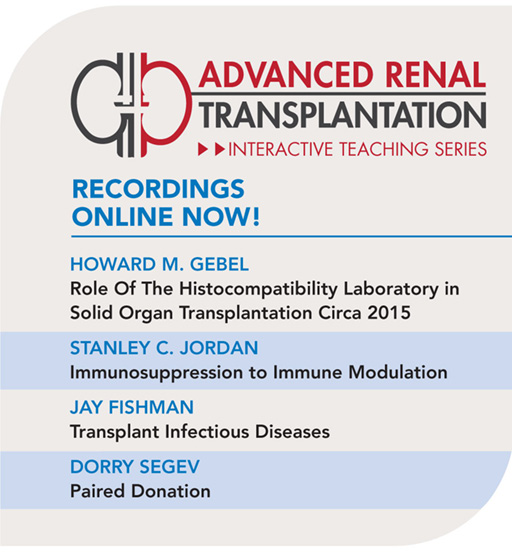
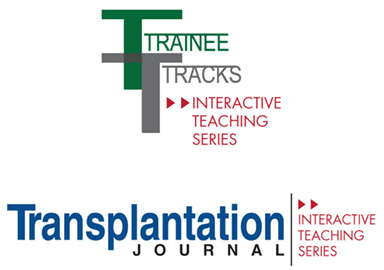

The Ethics Committee of TTS is actively developing a number of projects addressing hot topics related to the practice of donation and transplantation of organs, tissues and cells. These include donation in the context of end-of-life care, living donation from the vulnerable, and an investigation of TTS membership priorities in ethics education and resource development. Committee members Riadh Fadhil and Elizabeth Pomfret are chairing a working group on psychosocial evaluation of living donors, which launched an international online survey in August. The expected long-term outcomes of this project include the development of guidelines or resources for use in the psychosocial screening of living donors in developing programs.
If you would like to learn more about this survey or to participate in it, please visit the survey site here. The survey, which will close at the end of September, can be completed in English, Spanish, Arabic, or Chinese. It is open to all professionals working in transplantation from living donors. The Committee is very grateful to those who have already participated and helped in promoting the survey.
With the support of TTS and the Asian Society of Transplantation, the Committee organized a joint TTS-AST ethics session at the recent Congress of the Asian Society of Transplantation held in Singapore. Chaired by Jacqueline Chin from the National University of Singapore, and Ethics Committee vice-chair Dominique Martin from the University of Melbourne, the session featured expert speakers from New Zealand, Qatar, Singapore, Sri Lanka, and the United States. The audience enjoyed six presentations and a thought provoking panel discussion of the ethical and practical challenges of performing psychosocial evaluation of living organ donors in diverse healthcare systems and in the context of international travel for transplantation.
The Ethics Committee is pleased to announce the appointment of Professor Richard Trompeter as the inaugural IPTA section liaison to the Committee. This new position will help to ensure that paediatric transplant ethics remain a core focus of the Committee’s work following the success of last year’s meeting in Geneva on Paediatric Deceased Donation. You can read the report of the meeting here.
The Ethics Committee welcomes suggestions from TTS members regarding areas of interest or concern in transplantation ethics, and opportunities to assist in the development of ethical streams in conference programs. Please get in touch with the Committee Chairs if you would like to know more about our work. The Committee can be reached directly at ttsethicscommittee@gmail.com.
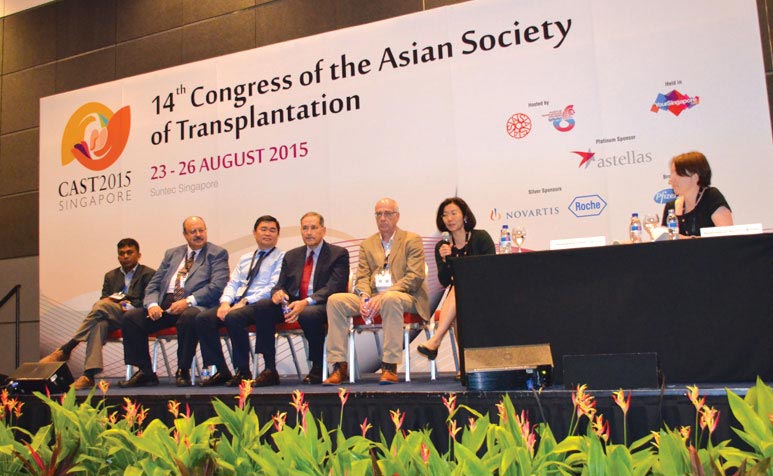

Building upon the strength of previous meetings in Paris (2013) and Boston (2011), this year’s Transplantation Science Symposium brings together an outstanding program of international speakers. Highlights include presentations by Prof. Peter Doherghty, awarded the Nobel Prize for discovering the principles of T cell activation, and Prof. Shimon Sagakuchi, a leading figure in our understanding of regulatory T cells.
An additional first for the Transplantation Science Symposium will be the 1st Global Virtual Laboratory Workshop. This workshop will be held on the
11th November 2015 and precede the Basic Science Symposium. This workshop will provide a fantastic opportunity to learn from an international panel of experts on how to get the most out of your clinical blood samples for phenotypic and function analysis. With the aim being the standardizing of human peripheral blood mononuclear cell preservation and analysis this workshop is a great opportunity to bring your questions and experiences and participate in a Q&A discussion session led by those at the forefront of the cell therapy fields.
Another highlight of the meeting is that the Transplantation Science Symposium will host the “Transplantomics” meeting with a special session on Friday the 19th of November.
Already shaping up to be the “Meeting of the Year”, TTS has partnered together with a number of individual national societies to provide over 20 travel awards and Mentee-Mentor Awards to support deserving trainees’ attendance. These awards provide an excellent opportunity for trainees to get access to information on the latest updates in composite organ transplants, emerging immune therapies, stem cells, immunology and the most recent updates from The ONE Study.
The continuation of the mentor-mentee awards with the support of local transplant societies highlights the important place this meeting plays in supporting the education goals of TTS and the global transplant community. We particularly note the support of the Asian Transplant Society and Japanese Society for Transplantation, ASRT, ESOT, ILTS, ISHLT, MESOT, TSANZ, and The University of Sydney.
As this year’s Transplantation Science Symposium will run prior to the joint IPITA, IXA and CTS Congress taking place in Melbourne from November 15–19, 2015, November is set to be an outstanding time to catch up on the latest in transplantation and participate in a world class series of meetings.
See you in November in beautiful Lorne!
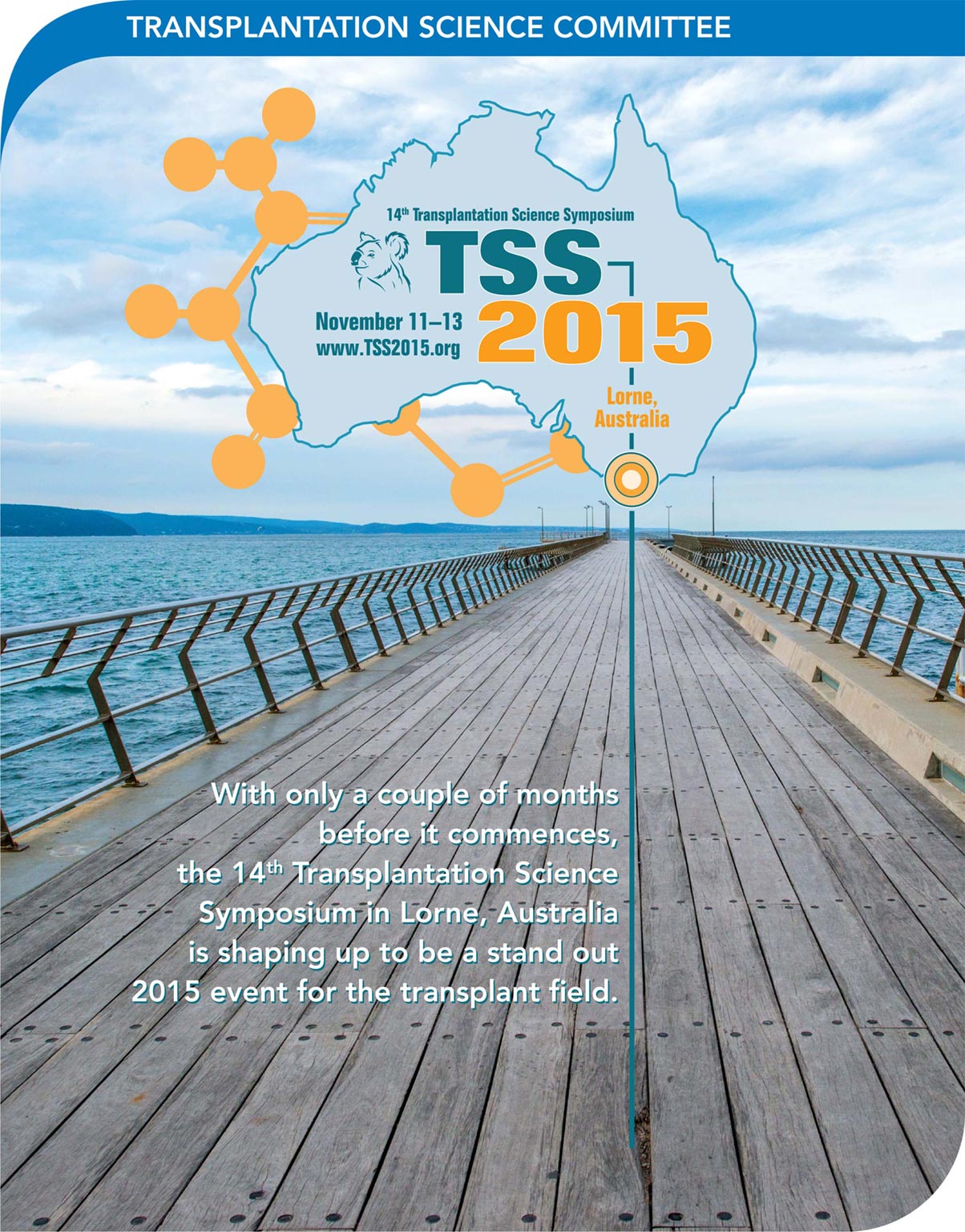
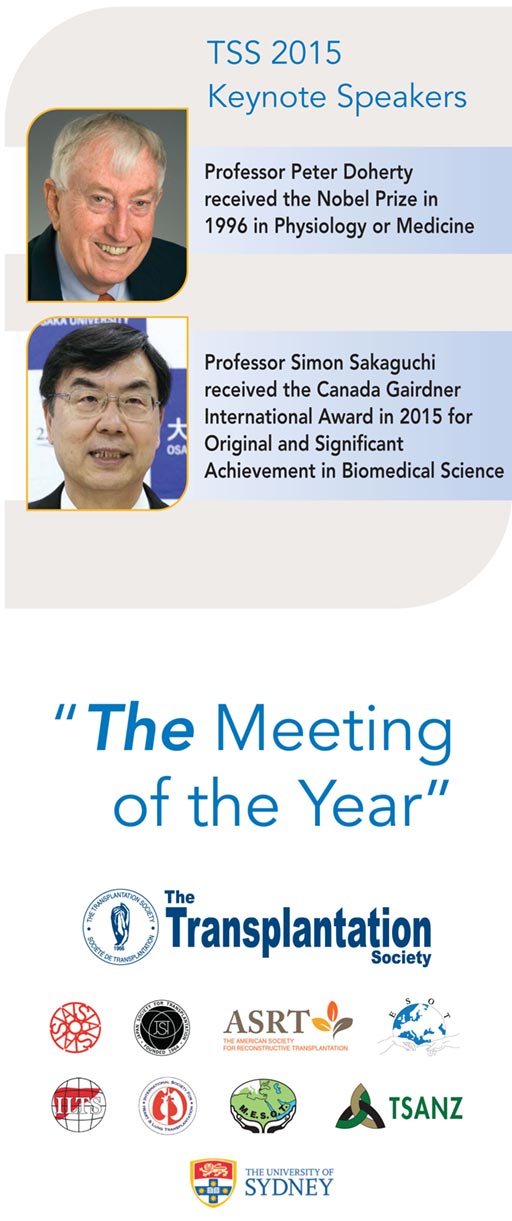

The ISN-TTS Sister Transplant Center Program is a joint partnership between The International Society of Nephrology (ISN) and The Transplantation Society (TTS) to support the initiation of new kidney transplant centers and the development of existing kidney transplant programs in emerging countries around the world.
If you are interested, please apply for the ISN-TTS Sister Transplant Center Program by completing the Application Form and the Budget Proposal Form.
The deadline for applications is October 1st 2015.

To consolidate its position as the leading global organization, the Council has representation from all six regions of the world: Asia, Europe, Latin America, Middle East/Africa, North America and Oceania.
EXECUTIVE MEMBERS
| PRESIDENT Philip J. O’Connell |
| PRESIDENT-ELECT Nancy Ascher |
| IMMEDIATE PAST PRESIDENT Francis L. Delmonico |
| VICE-PRESIDENT Marcelo Cantarovich |
| SECRETARY Gabriel Danovitch |
| SENIOR TREASURER John J. Fung |
| TREASURER Elmi Muller |
| HISTORIAN Randall E. Morris |
| INTERNATIONAL HEADQUARTERS Jean-Pierre Mongeau Executive Director |
COUNCILORS
| ASIA Jongwon Ha Vivekanand Jha Shiro Takahara |
| EUROPE Beatriz Domínguez-Gil Dirk R.J. Kuyper |
| LATIN AMERICA Rudolf Garcia-Gallont Alejandro Niño Murcia |
| MIDDLE EAST / AFRICA Ifeoma Ulasi |
| NORTH AMERICA Minnie Sarwal Megan Sykes Stefan G. Tullius |
| OCEANIA Josette Eris |
Tribune is published four times per year by The Transplantation Society (TTS).
Editor-in-Chief: Nancy K. Man
International Headquarters
International Headquarters
The Transplantation Society
505 boul. René-Lévesque Ouest
Suite 1401
Montreal, QC H2Z 1Y7 CANAD
T. +1.514.874.1717
F. +1.514.874.1716
E. info@tts.org
W. www.tts.org
Please contact any of our dedicated staff for any assistance you may require:
| Roman Beliaevski IT/Multimedia roman.beliaevski@tts.org |
| Roberto Colarusso Director of Technologies robert.colarusso@tts.org |
| Geneviève Leclerc Director of Meetings genevieve.leclerc@tts.org |
| Frank Líndo Verissimo Meetings & Exhibits Coordinator frank.lindoverissimo@tts.org |
| Sondra Livingston Sections Manager sondra.livingston@tts.org |
| Amanda Mayer Membership Services Coordinator amanda.mayer@tts.org |
| Jean-Pierre Mongeau Executive Director jp.mongeau@tts.org |
| Catherin Parker Meetings Manager catherin.parker@tts.org |
| Chelsea Patriquin Meetings Coordinator chelsea.patriquin@tts.org |
| Denise Rainville Controller denise.rainville@tts.org |
| Anaïs Rodriguez Meetings Manager anais.rodriguez@tts.org |
| Eugenia Siu Registration & Administration Coordinator eugenia.siu@tts.org |
| Darren Woodbury Graphic Designer darren.woodbury@tts.org |
| Chi Hong Yeung Accounting Clerk chihong.yeung@tts.org |
Contact
Address
The Transplantation Society
International Headquarters
740 Notre-Dame Ouest
Suite 1245
Montréal, QC, H3C 3X6
Canada
Используйте Вавада казино для игры с бонусом — активируйте промокод и начните выигрывать уже сегодня!

